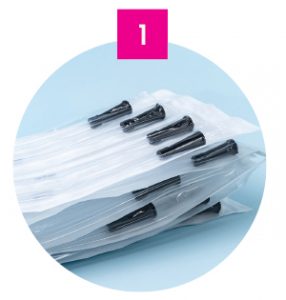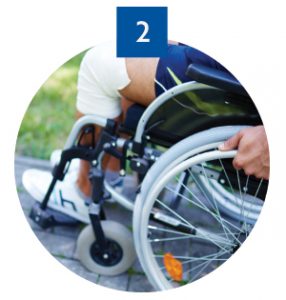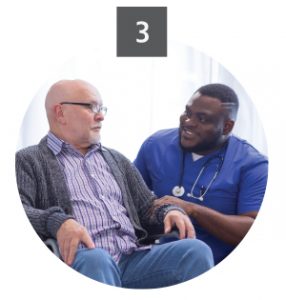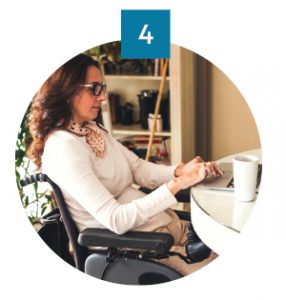People with disabilities experienced profound hardship during the last provincial election cycle. The pandemic exposed longstanding gaps in essential services and supplies, while barriers to health and wellbeing grew worse in many areas. Now Spinal Cord Injury Ontario (SCIO) is asking the disability community to unite in getting their most urgent issues on the agenda for the Ontario election in June.
“Over the last couple of years, we’ve been engaging with our members to learn about their leading concerns,” says Peter Athanasopoulos, Director of Public Policy at SCIO. “Based on those consultations, we’ve developed a comprehensive election plan that empowers people to draw candidates’ attention to these matters.”
A one-stop shop for information and action
‘Your Move, Ontario,’ the interactive election hub on the SCIO website, makes it easy to get involved. A multi-layered toolkit for advocates offers a solid knowledge base by bringing together recent policy reports, quick stats, community stories, general information about spinal cord injury and key questions to ask candidates.
“Our community has been through a lot in recent years, and they recognize that change will only happen if we amplify our needs with our collective voice.”
– Peter Athanasopoulos | Director, Public Policy
Once people feel informed and ready to make a move, there are several avenues to action just a click away. Community members can email pre-written or customized messages to their local candidates. They can send letters to the editor to any – or every – Ontario newspaper, whether they use the SCIO template or choose to share their personal story. And they can participate in ‘tweet storms’ – a rapid succession of related posts on Twitter. Almost everything in the election hub is automated and simple to use, says Athanasopoulos, so understanding the issues and connecting with candidates isn’t a burden.
While the election hub is hosted on the SCIO website, anyone can use its resources and join in on the various campaigns. “The issues we’re highlighting don’t just affect people with spinal cord injuries,” says Athanasopoulos. “They affect people with other disabilities, as well as the aging and senior populations. Our aim is to mobilize everyone who believes the government has a responsibility to bring equity and inclusion to Ontarians with disabilities.”
How a global crisis revealed inequities close to home
Athanasopoulos says the upcoming provincial election is especially critical because the pandemic demonstrated that the government isn’t prioritizing the needs of people with disabilities. “We were a forgotten conversation most of the time, though we were disproportionately affected by COVID-19. We also witnessed blatant human rights discrimination, such as the government’s lack of transparency on the place of people with disabilities in triage protocols.”
He says the stories he’s heard from the SCIO community over the last two years paint a picture of intense struggle and suffering. “Everything became harder for them in terms of securing what they needed for daily living. At the same time, they were experiencing COVID-related stress and social isolation. For many people, continuously fighting to meet their basic needs decreased their confidence and passion for life.”
One positive outcome of the pandemic was that the rise of virtual communication created new networks in the community. Athanasopoulos noticed a steady strengthening of digital communication among SCIO members, resulting in heightened awareness of failures across the support system for people with disabilities. “We saw individuals province-wide link up online and realized that they weren’t alone in their challenges.”
Four issues that can’t wait
These online discussions, along with more formal consultation by Athanasopoulos and his team, brought four pressing issues to the forefront.

1. Access to medical supplies
Since 2018, SCIO has been seeking commitments from the Ontario government on accessible, affordable catheters and related urinary supplies. The ‘Pee for Free’ campaign – which has led to 93 government meetings to date – is not over. The government still enables the potentially harmful reuse of single-use intermittent catheters, which 33,000 Ontarians rely on every day. An efficient provincial medical supply program should cover these and other vital items for people with disabilities.

2. Access to mobility devices
Mobility devices for those with a permanent disability should be considered a human right, not just a medical need, according to 95 per cent of the SCIO community. The Ontario government currently funds only certain mobility aids, such as wheelchairs, for people with disabilities who live at home. Yet these are rarely enough. Many Ontarians need other devices to support their independence, from therapeutic support surfaces and seat-elevating devices to floor and ceiling lifts. All of these things should be accessible and affordable for people with disabilities.

3. Access to attendant services in the community
The unsurprising consensus among SCIO members is that nobody in Ontario should be unable to get out of bed in the morning – or accomplish any fundamental activity – because they can’t secure a Personal Support Worker (PSW). It was already hard to access qualified attendant services at home before the pandemic; staff shortages due to COVID-19 made a bad situation worse, as higher wages and consistent schedules drew PSWs to long-term care facilities and hospitals. The Ontario government must enact policies for recruitment, retention and standards of practice that make attendant services in community settings a sustainable career, ensuring access to reliable care.

4. AODA commitment
The SCIO community knows firsthand that the Accessibility for Ontarians with Disabilities Act (AODA) is far from reaching its goal of a fully accessible province by 2025. Before the pandemic sidelined efforts to develop and enforce accessibility standards for government, businesses, non-profits and public sector organizations, too little was happening too slowly. Now time is quickly running out. SCIO is actively involved in several AODA committees, and is calling on the government to accelerate the creation, implementation and enforcement of accessibility standards.
Each of these four issues impacts people with disabilities’ capacity to lead healthy, happy, independent lives, says Athanasopoulos. “Some of the priorities may sound relatively small on their own, but in fact they’re all quite huge. We’re asking candidates to imagine what it would be like to be stuck in bed, to lack the means to go to the washroom, or to have no way to enter a store or even their child’s school.”
To help candidates get educated on these issues and others that are important to people with disabilities, the SCIO election hub includes a separate candidate toolkit. It includes all the same resources in the advocate toolkit along with stark statistics – 70 percent of eligible Ontarians wait six or more months to receive government funding for mobility devices, for example – that underscore the deficiencies in current provincial policies.
Looking back while moving forward
More than seven decades of SCIO activism underpin this most recent advocacy project. Athanasopoulos says he draws inspiration from the achievements of previous generations, yet he acknowledges the harsh reality that many battles aren’t over. “I think our founders would be frustrated to see people with disabilities facing the same challenges they did many years ago because governments aren’t adequately addressing the problems.”
Athanasopoulos says SCIO will gauge the success of the election toolkits by the volume of community participation and the number of disability-related commitments made by individual candidates and parties. Similar efforts in the past have had remarkable results. Leading up to the 2019 federal election, SCIO and its partners secured Prime Minister Justin Trudeau’s promise to bring forward the Accessible Canada Act. Shortly after the election, Bill C-81 passed.
Advocacy is not a government-funded program at SCIO, so the sustainability of campaigns like this depends on donors. “There are so many ways to make a difference at the policy level, whether you choose to financially support our campaigns or fuel them with your participation,” says Athanasopoulos. Despite ongoing systemic barriers and the devastation caused by COVID-19, he remains optimistic. “Our community has been through a lot in recent years, and they recognize that change will only happen if we amplify our needs with our collective voice.”



